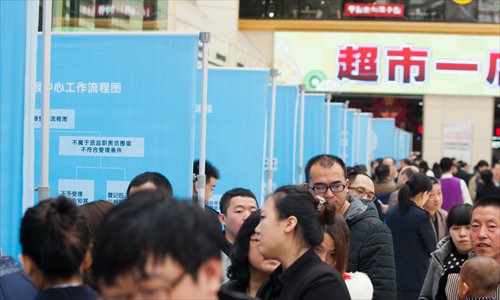Premier Li calls on retailers to put more focus on product quality
Authorities, e-commerce firms trying to crack down on unsafe, false items

Consumers attend a consumer rights protection event organized by government departments in Changchun, capital of Northeast China's Jilin Province on Sunday. Photo: IC


Retailers, both online or off-line, need to pay more attention to their products in order to protect consumers, Chinese Premier Li Keqiang said on Sunday.
During a press conference following the closure of the annual session of the National People's Congress, Premier Li Keqiang highlighted the key role of e-commerce in boosting the Chinese economy, and urged brick-and-mortar as well as online stores to be honest.
The remarks came on World Consumer Rights Day, which fell on Sunday and is known as "3/15" in China, a time when domestic supervisory authorities and media outlets put more focus on consumers' complaints and the exposure of companies that have alleged quality issues.
The State Administration for Industry and Commerce (SAIC), China's top quality watchdog, said on its website Thursday that a WeChat consumer complaint account would be opened during the live broadcast of China Central Television's annual gala for World Consumer Rights Day to accept consumer complaints which would be handled by local authorities in a timely manner. WeChat is a popular social networking mobile app in China.
Food safety is the most important issue among Chinese Web users, according to a chart jointly issued on Sunday by Internet search engine giant Baidu Inc and China Association for Quality Promotion.
The result was echoed by a report by Weibo, a Chinese Twitter-like social networking platform, that claimed food safety suffered the most complaints in 2014, which accounts for 45 percent of critical posts on Weibo.
Increased attention has been paid to food safety by Chinese consumers since the eruption of the Chinese milk melamine scandal in 2008, and this is a good thing that can continuously strengthen regulations in the sector, Ma Wenfeng, a senior analyst at Beijing Orient Agribusiness Consultant, told the Global Times Sunday.
In 2014, Chinese authorities imposed stricter supervision and examination of food, resulting in 98.5 percent of the total inspected samples meeting the country's standards over the year, the Xinhua News Agency reported in February.
With further government control on production as well as distribution, domestically produced food and beverage are expected to become safer, said Ma.
In order to enhance the authorities' ability to address potential food safety scandals, the State Council released a guidance for the national food safety regulation for this year on Saturday ahead of the World Consumer Rights Day, calling for a list of food safety problems and more regulations for the sector.
Ma also noted that the emergence of social media contributes to government's food safety supervision and regulation.
According to Weibo's report, there were a total of 869,591 consumer complaints via Weibo in 2014, up 62 percent year-on-year.
E-commerce or online shopping, which lack sufficient and clear regulation, is another issue that attracted Web users' attention, according to the chart showed on Baidu's website.
The SAIC said in a report on Thursday that it handled 77,800 consumer disputes with online shopping, up 356.6 percent year-on-year, involving 31.65 million yuan ($5.06 million) in total. The administration helped consumers reclaim 15.17 million yuan.
SAIC Minister Zhang Mao said during the two sessions on March 9 although the online counterfeit crackdown has made some progress, problems still remain, and he proposed the launch of laws for e-commerce as soon as possible.
SAIC has already issued measures against infringements on consumer rights in January, effective on Sunday, requiring online merchants to refund the purchase price to buyers with no questions asked within seven days after receiving the returned goods, otherwise they would be fined up to 500,000 yuan for deliberate delay or refusal to refund.
Zhao Zhanling, an IT legal expert with the Beijing-based Internet Society of China, told the Global Times Sunday that regulations and severe punishments are needed but law enforcement is also key.
"The recently released punishments by SAIC lack detailed rules, likely resulting in difficulties in enforcement," said Zhao.
Joint efforts are needed from government agencies, merchants, and e-commerce platforms as well as consumers to ensure an effective online fake goods crackdown, he noted.
WeChat issued a package of regulations on Sunday to rule out illegal practices such as selling counterfeit products via its platform, according to a Weibo post.
Meanwhile, Zhang Jianfeng, president of Alibaba's customer-to-customer bazaar taobao.com, said in an internal e-mail obtained by the Global Times Sunday that it will roll out new measures against problematic goods to "force dishonest merchants into bankruptcy."
CCTV spotlights auto, privacy issues
On an annual gala report aired on Sunday evening, China Central Television (CCTV) slammed some companies and industries for poor quality products or cheating consumers as it customarily does on World Consumer Rights Day.
Auto & fuel
Car dealerships of Dongfeng Nissan, Shanghai Volkswagen and Mercedes-Benz were reported to have exaggerated or even made up vehicles' mechanic problems in order to overcharge car owners for repairing or changing auto parts.
Some chemical enterprises in East China's Shandong Province falsified 93-octane gasoline by adding additives to lower-price 90-octane gasoline, resulting in damage to vehicles and heavier air pollution, according to the report.
Evoque SUV, a bestseller of premium car maker Land Rover, was accused of problems with its transmission, according to customers' complaints.
Information security
Hackers can steal all kinds of personal information on their smartphones, including photos and e-mail passwords, through free Wi-Fi that these smartphones are connected to.
Telecom carriers China Mobile and China Tietong were alleged to have allowed mass spam calls made from machines.
CCTV reported that Chinese residents' ID cards and information were sold online and that many banks allowed people to open up accounts with ID cards belonging to others.
Global Times
Read more in Special Coverage: